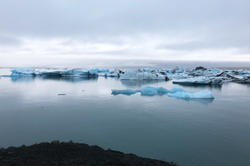Alum Ying Bonny Cai spent a year in Seoul studying traditional Korean apparel with contemporary makers reviving and modernizing ancient customs.
Maharam Fellows Find Workarounds

Since COVID-19 forced RISD to close campus in March, faculty and staff have been doing everything in their power to maintain a continuity of experience for students. “My whole staff has taken up that charge, almost as a mantra,” says Kevin Jankowski 88 IL, director of RISD Careers. One of the recurring programs they’ve been pleased to maintain this summer is the Maharam STEAM Fellowship in Applied Art and Design, with nine current students and recent graduates now wrapping up internships.
“Every student applicant had to scramble to retool their fellowship.”
Launched in 2012, the Maharam Fellowship program supports selected RISD students who propose projects for using their critical thinking and making skills in fields traditionally considered outside the realm of art and design. Historically, Maharam Fellows have activated change via hands-on internships in government and nonprofit organizations focused on everything from diversifying workforces to promoting traditional crafts to conserving wildlife. Proposals for this year presented new challenges since fellows had to modify their original plans midstream in light of the pandemic.

“Every student applicant had to scramble to retool their fellowship proposal,” Jankowski explains. “Their perseverance and ability to pivot have been impressive.”
Graduate student Valeria Ramirez Ensastiga MA 21, for example, had to shift the focus of her work with The Hunger Project-Mexico three times. Meanwhile, working from his current home base in Providence, Chetan Dusane MID 21 is helping the Panvel Municipal Corporation located just south of Mumbai, India to combat urban sensory overload. And Industrial Design major Kiki Nyagah 22 ID is working remotely as a researcher and design strategist for the Africa Economic Summit.

Utah native Eli Kauffman 21 PT is gratified that much of the work they proposed for a fellowship at Wasatch Community Gardens in Salt Lake City has gone according to plan. The organization provides healthy food and job training for marginalized people, including women experiencing homelessness. At the core of Kauffman’s efforts is a series of colorful, place-making murals created on site with input from Wasatch volunteers and community members.
“It was important to understand who would benefit from the work so that I could make pieces relevant to them.”

“I was nervous about facilitating a group art project,” Kauffman says, “but people were very excited to participate and had lots of their own good ideas to add.”
In their practice, the Painting major generally works in oil paint on canvas, so learning to apply spray paint to corrugated metal presented a formidable challenge. “Plus, I was creating work for a different audience than I’m used to,” Kauffman adds. “It was important to understand who would benefit from the work so that I could make pieces that are relevant to them.”

Another unexpected challenge came in the form of creating a video tour of the farm for those unable to come in person due to the pandemic. “My good friend Ben, who goes to film school, was kind enough to volunteer their time for a day so that I could play more of a directorial role while we filmed,” says Kauffman.

On the other side of the world, Brown/RISD dual degree student Yunni Cho BRDD 21 IA has been exploring the effects of daylight and color on human perception—from her home in Seoul, South Korea. “I originally intended to travel to Hamburg, Germany to conduct fieldwork with lighting designer Ulrike Brandi,” says Cho. “But the pandemic made travel and in-person interactions impossible, so we found a way to turn everything remote.”
An Interior Architecture major at RISD who is focusing on both urban studies and cognitive neuroscience at Brown, Cho totally embraced the opportunity to shape her fellowship to suit her interests. “I think the reason Maharam is special is because it allows students to take more initiative and be more empowered,” she explains. “I really had the freedom to design the fellowship to fit my needs.”
“This fellowship really opened my eyes to the potential of virtual collaboration and online learning.”
Instead of working on site with the European chapter of the nonprofit Lighting Detectives in Hamburg, Cho is conducting research and sharing data with the organization via a virtual server that allows her to collaborate simultaneously with chapters around the world. She’s hoping to publish her research in the form of two books: a digital publication analyzing different forms of light called Choreography of Light and a handmade artist’s book called Transient Stillness, which will feature her drawings and explore the beauty of natural light.
“This fellowship really opened my eyes to the potential of virtual collaboration and online learning,” says Cho. “I considered taking a gap year but changed my mind and will study remotely beginning in September with the hope of returning to Providence in late December. There’s so much that can be gained through virtual work.”
—Simone Solondz
August 14, 2020


